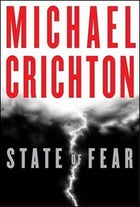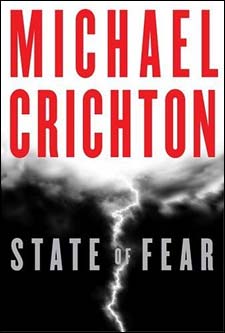Two-thirds of the way through Michael Crichton’s State of Fear, beautiful secretary Sarah Jones catches herself looking appraisingly at young lawyer Peter Evans as they investigate the mysterious death of their environmental philanthropist boss. When the book begins, Evans is a Prius-driving believer in the quaint scientific notion that humans are heating up the planet, but after radical environmentalists try to kill him by dumping his snow crawler down an Antarctic crevasse and attaching a lightning attractor to his walkie-talkie, he wakes up to the truth: Global warming is a fiction perpetrated by greedy environmental groups. My, thinks Sarah, who’s “starting to see a side of him [that’s] not wimpy, but rather tough and resilient in his own bumbling way . . . [she’s] beginning to have the first feeling of stirrings toward the man.”
Michael Crichton state of fear
 State of Fear
State of Fear
Ooh, stirrings.
When State of Fear was published, in December, the worst thing about it was its endless parade of clichés. But after the year-end Indian Ocean tsunami, its vileness came into higher relief. In Crichton’s fictional world, tsunamis are the work of ecoterrorists trying to dupe people into thinking global warming is a threat. This device, which drives the plot, never made much sense to begin with. Tsunamis are caused by tectonic and volcanic forces, which, even after December 26, no one has tried to link directly with climate change.
But plot isn’t the point of this book; politics is. And Crichton weaves in graphs and journal citations with all the finesse of a guy speed-talking the financing info at the end of a car commercial. He is convinced, he writes in a bizarre “author’s message,” that the consensus about global warming is nonsense—that our tools are too crude to predict the future and that researchers slant their findings to please their patrons. His fictional environmentalists, players in “a multi-billion-dollar industry,” simply lie to raise more money.
It is, in short, a book about intellectual honesty, which is an important topic. In a world of complex questions that turn on subtleties of chemistry and physics, it’s important to know that you can trust supposedly neutral arbiters. And Crichton is right to challenge environmentalists for a certain amount of silliness: The fight for global-warming legislation in this country was probably lost when green groups decided Leonardo DiCaprio should lead the charge.
If you’re going to decry intellectual dishonesty, though, better do it with clean hands. Almost every study supporting Crichton’s “no worries” stance is lovingly footnoted; many are the same threadbare examples that the oil lobby has shopped for a decade. No opposing evidence gets mentioned, unless it contains a caveat, which is then used to show that even the proponents of the theory don’t believe it. For instance, in one of the few places he mentions the 2001 Intergovernmental Panel on Climate Change report, he quotes a line about how global warming hasn’t affected the number of thunderstorms or tornadoes. This only underscores the dire warnings that the report does contain, like reduced crop yields and killer heat waves, warnings that a disbelieving President Bush sent to the National Academy of Sciences to check out—and which, they reported back, were accurate.
State of Fear has doubtless pleased those forces resistant to doing anything about global warming. But Crichton’s own reactionary nastiness may undermine the power of his exercise. We’ve all been struck by the common humanity of tourists and poor fishermen and unlucky children swept away by the great tsunami. So it leaves an especially bitter taste that State of Fear‘s sole representatives of the coast-dwelling Third World are a cannibal king and his flesh-eating minions. They digest one white man—a smugly green Hollywood actor—while our heroes manage to escape. On the private jet home, Peter and Sarah progress beyond stirrings to embraces. At last, all is well.

